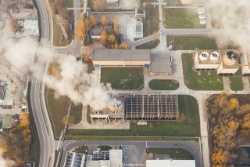Mining’s Role In Restarting New Zealand
As New Zealand businesses ponder how the New Zealand economy can recover post-lockdown, different industries will assume new levels of importance in the challenging environment we face.
The mining and extractive sector is one that will play a vital role in the coming months - rekindling New Zealand’s prosperity and pumping millions of dollars into heartland New Zealand in regions that need it most.
Mining will contribute to the export-led recovery as a major earner of foreign exchange and an essential link in the export supply chain. Gold is our second largest export to Australia and coal keeps our agricultural exports competitive as well as being exported in its own right.
The sector will provide construction materials such as steel, cement and aggregate needed for the government’s “shovel-ready” infrastructure proposals - a centerpiece of the economic recovery strategy.
Mining’s importance was reinforced in March as we entered Level 4 lockdown. In spite of coal’s sometimes maligned reputation, the government was quick to accept that coal was needed as part of the essential service supply chain - primarily for food processing and hospital services.
Coal also plays an important role in providing energy security in times of gas shortages and adverse weather events. Premium grade coking coal is mined to meet demand from international steel manufacturers. At present there are no commercially viable technologies to make steel at scale without coking coal.
Across the ditch, the resources sector is also leading Australia’s economic recovery. Mining underpins that country’s success as a trading nation – generating $A290bn in export earnings last year. Australian mining will be a key component in growing the Australian economy, with flow-on benefits to New Zealand through our exports to the Lucky Country. A Trans-Tasman bubble, if it can be achieved, will also help New Zealand benefit from Australia’s mining prosperity through tourism and other business engagement.
There are also opportunities for mining to increase its contribution to New Zealand’s prosperity in the longer term as we move to a lower carbon economy. Minerals are needed in abundance to make wind turbines, solar panels and batteries etc. Demand for many minerals is likely to increase according to a recent report by the World Bank. New Zealand has the potential to supply some of these minerals. Lithium, rare earth elements and nickel-cobalt are examples of minerals which will be part of the low carbon economy – all of which New Zealand has the potential to supply, providing we have access to land to explore, and appropriate regulation.
The recent Court of Appeal decision to quash Trans-Tasman Resources consent to mine the South Taranaki Bight is frustrating because the vanadium-rich iron sand resources that TTR is seeking to access have a range of significant environmental, social, economic and technological benefits that would have benefited New Zealand immensely in this way.
What some people don’t realise is that if we don’t mine in New Zealand, we simply import the resources we need from other countries. We can choose to allow mining to occur overseas, but that will often be in places with lower environmental and safety standards than we have in New Zealand, and sometimes in places where labour is exploited.
New Zealand imported more than a million tonnes of coal last year - the highest volume since 2006. Using local coal in its place would have had a range of societal benefits not just in terms of the local mining jobs secured.
It is currently a difficult time for mining in New Zealand. The continued push by some politicians to further restrict mining only compounds those difficulties.
Generally, the government has taken care not to impose unnecessary costs on the business sector as it carries out its policy response to Covid-19 and so we were disappointed with the announcement of a substantial strengthening of the Emissions Trading Scheme.
Straterra acknowledges the importance of reducing global carbon emissions but it is essential that the ETS aligns with our trading partners and the competitiveness of affected sectors of the economy is maintained.
In the coming months, as New Zealand maneuvers its way out of what will probably be the most severe recession in 100 years, it is important we do not constrain the industries that have the capacity to pull us through. And that means not imposing unnecessary barriers on them. Mining is certainly one of those industries.


 Brewers Association: Brewers Association Of New Zealand Supports Modernisation Of Alcohol Legislation
Brewers Association: Brewers Association Of New Zealand Supports Modernisation Of Alcohol Legislation Commerce Commission: ComCom Warns Of Pyramid Schemes After South Auckland Scammers Plead Guilty
Commerce Commission: ComCom Warns Of Pyramid Schemes After South Auckland Scammers Plead Guilty MBIE: MBIE Publish Mid-Point Review Of The Phase-Out Of The Low Fixed Charge (LFC)
MBIE: MBIE Publish Mid-Point Review Of The Phase-Out Of The Low Fixed Charge (LFC) Science Media Centre: Company Claims To Have “De-Extincted” The Dire Wolf – Expert Reaction
Science Media Centre: Company Claims To Have “De-Extincted” The Dire Wolf – Expert Reaction Stats NZ: Greenhouse Gas Emissions Fall 2.0 Percent In The December 2024 Quarter
Stats NZ: Greenhouse Gas Emissions Fall 2.0 Percent In The December 2024 Quarter The Reserve Bank of New Zealand: Christian Hawkesby Appointed As Governor Of The RBNZ
The Reserve Bank of New Zealand: Christian Hawkesby Appointed As Governor Of The RBNZ



